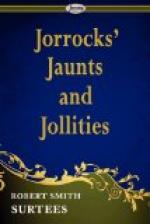its throat, when, being as wise as he was at starting,
he stuck his thumb in his side, and took a mental survey
of the whole.—“Ah,” said he
at length—“foin ’oss,—foin
’oss; vot ears he has?” “Oh,”
said Rogers, “they show breeding.”
“Non, non, I say vot ears he has?” “Well,
but he carries them well,” was the answer.
“Non, non,” stamping, “I say vot
ears (years) he has?” “Oh, hang it, I twig—four
years old.” Then the Baron took another
long look at him. At length he resumed, “I
vill my wet.” “What’s that?”
inquired Rogers of Jorrocks. “His wet—why,
a drink to be sure,” and thereupon Rogers went
to the pump and brought a glass of pure water, which
the Baron refused with becoming indignation.
“Non, non,” said he stamping, “I
vill my wet.” Rogers looked at Jorrocks,
and Jorrocks looked at Rogers, but neither Rogers
nor Jorrocks understood him. “I vill my
wet,” repeated the Baron with vehemence.
“He must want some brandy in it,” observed
Mr. Jorrocks, judging of the Baron by himself, and
thereupon the lad was sent for three-penn’orth.
When it arrived, the Baron dashed it out of his hand
with a prolonged sacre-e-e-e—! adding “I
vill von wet-tin-nin-na-ary surgeon.” The
boy was dispatched for one, and on his arrival the
veterinary surgeon went through the process that the
Baron had attempted, and not being a man of many words,
he just gave the Baron a nod at the end. “How
moch?” inquked the Baron of Rogers. “Five
hundred,” was the answer. “Vot, five
hundred livre?” “Oh d——n
it, you may take or leave him, just as you like, but
you won’t get him for less.” The
“vet” explained that the Baron wished to
know whether it was five hundred francs (French ten-pences),
or five hundred guineas English money, and being informed
that it was the latter, he gave his conical hat a
thrust on his brow, and bolted out of the box.
But race hour approaches, and people begin to assemble
in groups before the “rooms,” while tax-carts,
pony-gigs, post-chaises, the usual aristocratical
accompaniments of Newmarket, come dribbling at intervals
into the town. Here is old Sam Spring in a spring-cart,
driven by a ploughboy in fustian, there the Earl of——
on a ten-pound pony, with the girths elegantly parted
to prevent the saddle slipping over its head, while
Miss——, his jockey’s daughter,
dashes by him in a phaeton with a powdered footman,
and the postilion in scarlet and leathers, with a
badge on his arm. Old Crockey puts on his greatcoat,
Jem Bland draws the yellow phaeton and greys to the
gateway of the “White Hart,” to take up
his friend Crutch Robinson; Zac, Jack and another,
have just driven on in a fly. In short, it’s
a brilliant meeting! Besides four coronetted
carriages with post-horses, there are three phaetons-and-pair;
a thing that would have been a phaeton if they’d
have let it; General Grosvenor’s dog-carriage,
that is to say, his carriage with a dog upon it; Lady
Chesterfield and the Hon. Mrs. Anson in a pony phaeton
with an out-rider (Miss—— will have
one next meeting instead of the powdered footman);
Tattersall in his double carriage driving without
bearing-reins; Old Theobald in leather breeches and
a buggy; five Bury butchers in a tax-cart; Young Dutch
Sam on a pony; “Short-odds Richards” on
a long-backed crocodile-looking rosinante; and no end
of pedestrians.




